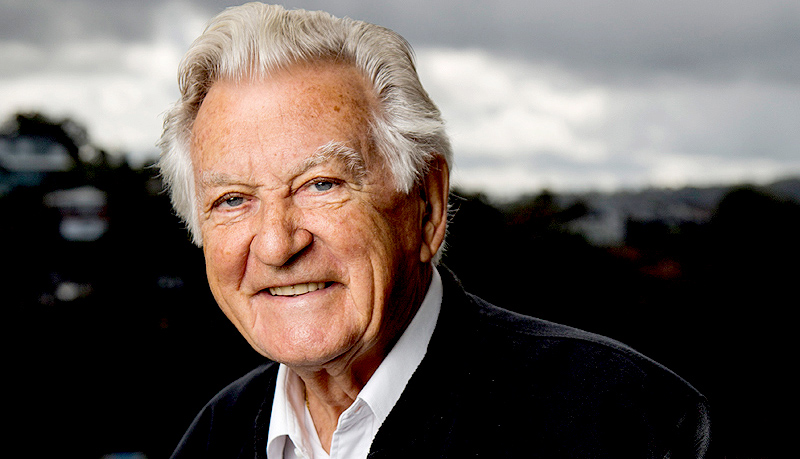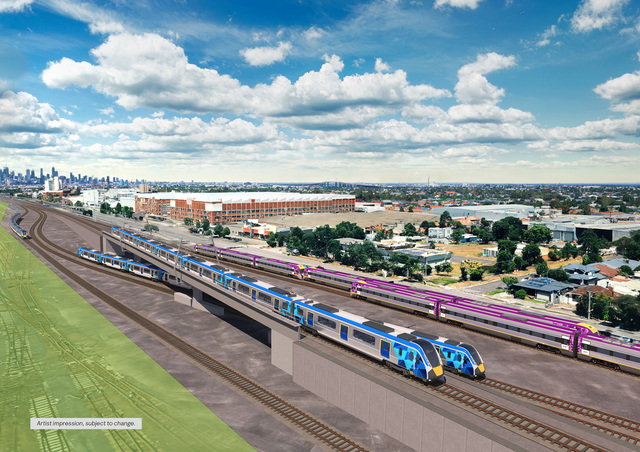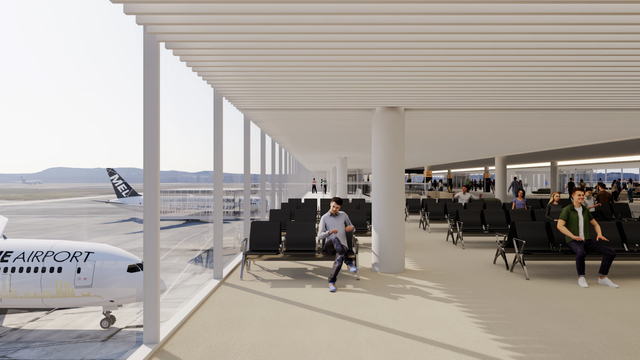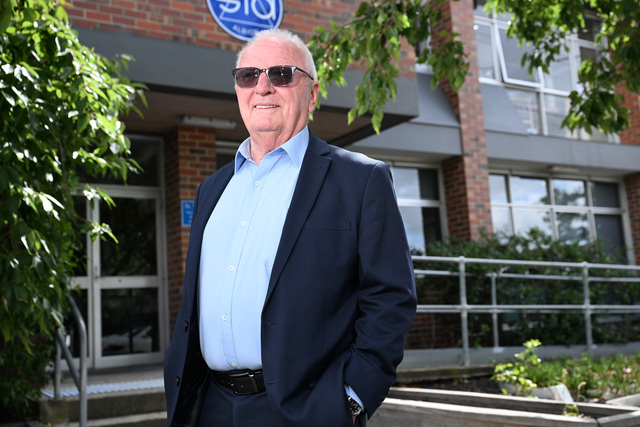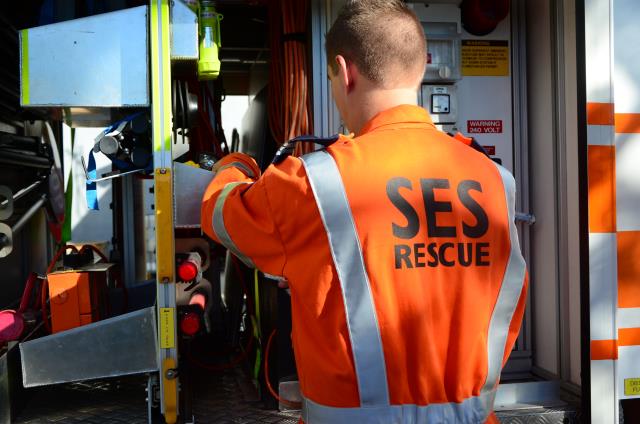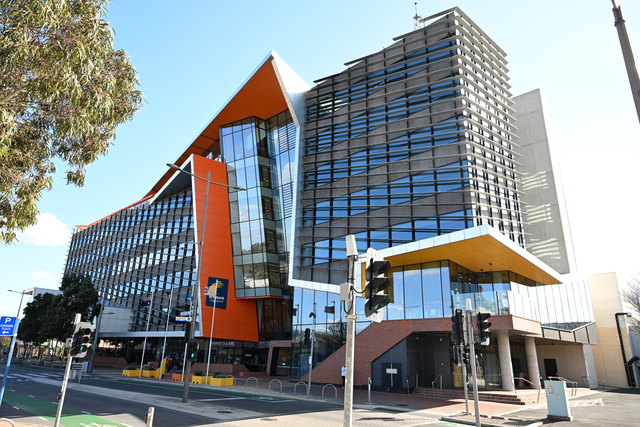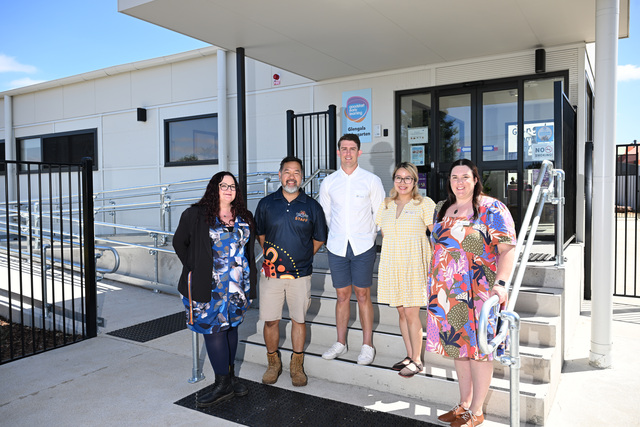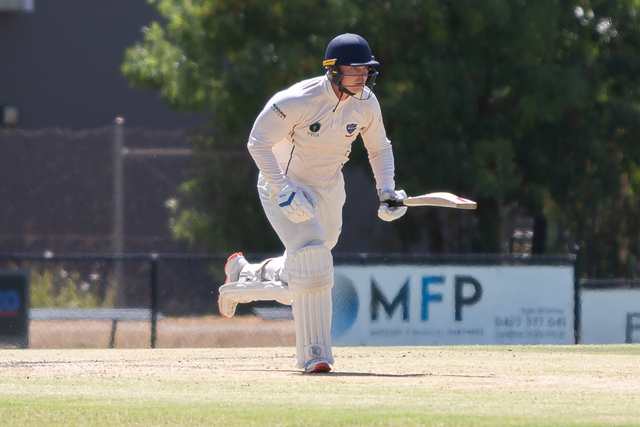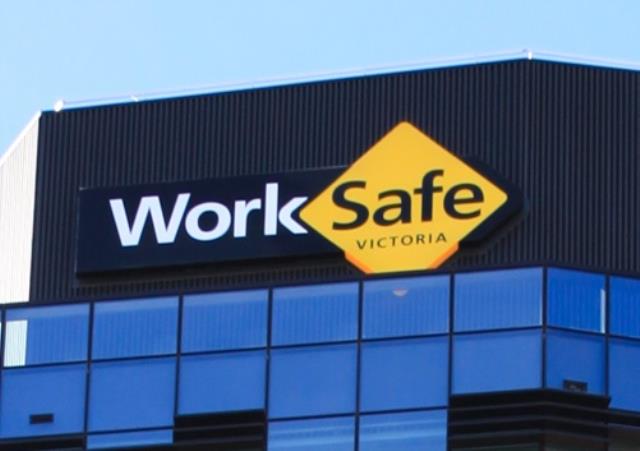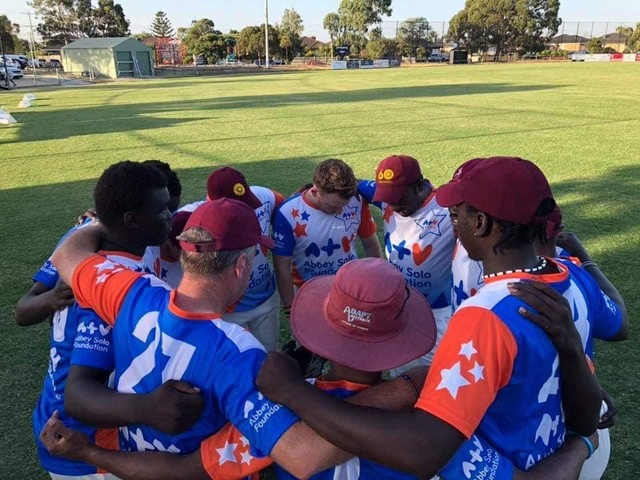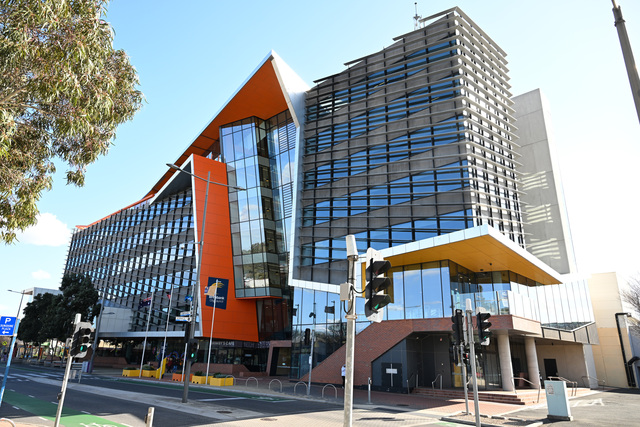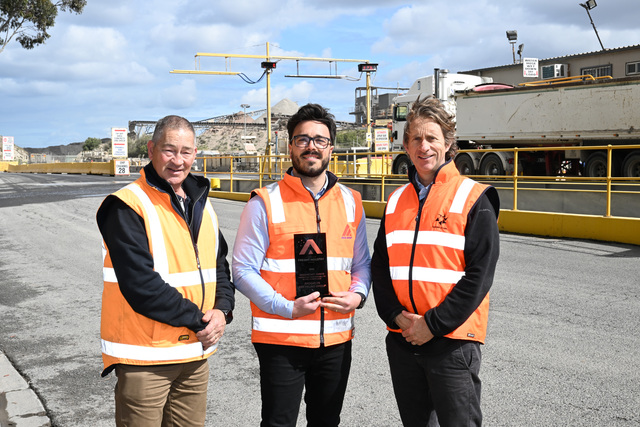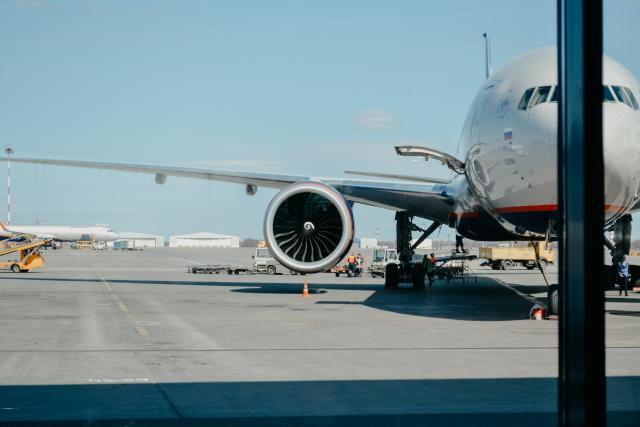Bob Hawke is reflecting on a favourite moment of calm in his still busy life. “I have the most beautiful spot in Sydney,” he says. “I have a beautiful natural forest going right down to the water and a boatshed where I catch fish. And I sit on my verandah smoking my cigar and I look out there doing my cryptics [crosswords] and I’m very happy.”
It’s an Arcadian image, and one to which I can attest having visited the Hawke home last year to interview his wife, Blanche d’Alpuget. The views from their house are indeed stunning. It’s a house full of art and sculptures and sunshine and a demonstrable love between its owners. It’s no wonder that today Hawke sounds like a blessed man.
We’re back in Sydney, this time in Hawke’s office in the city. He’s in a jovial, even mischievous, mood, laughing at some of the moments that cemented him as a very human prime minister, whose flaws more than likely increased, rather than diminished, the affection in which he was held. One such moment was when, on a shopping centre visit in 1989, he called a 74-year-old pensioner a “silly old bugger”.
“There was a very interesting follow-up to that,” Hawke says. “I got a letter from his daughter which said, ‘You’re absolutely right – he’s worse than that’.”
It’s been a long journey for me to get this close to Australia’s 23rd prime minister. There have been emails and phone calls over more than a year. Hawke doesn’t do many interviews, his executive assistant told us. After all, what more could he possibly say after so long in the public eye?
Plenty, as it turns out. At 84, Hawke is expansive, candid, self-deprecating and relaxed. Has he had a lucky life? “Yes, and it’s as a result of the most brilliant decision I ever made: my choice of parents,” he says.
“I never cease to give thanks for the marvellous father and mother I had. They provided me with constant, unqualified love and affection and encouragement.
“My mother was a teacher and she was fanatically devoted to education. I remember her saying, ‘Bob, you’re lucky, you’ve been born with brains but you’ve got to use them and develop them’.
“My father too was marvellous. He said something to me that has remained a basic tenet and motivation for me. He said: ‘If you believe in the fatherhood of God, you must necessarily believe in the brotherhood of man’. Their values influenced my thinking and my attitudes all through my life.”
I ask him to reflect on his political career. “It’s a sense of satisfaction because I believe, and I’m encouraged by the judgment of others, that our government was able to make a real difference to Australia in a number of ways.”
One of those was helping dismantle apartheid in South Africa. “Australia was the first country Mandela visited after he became leader,” Hawke says. “He walked into my office and he said, ‘Bob if it wasn’t for you I wouldn’t be here today’. That was a great tribute, not just to me, but to Australia and the role we played.”
I suggest to Hawke that he governed from the head but also from the heart. He cried on television after the Tiananmen Square massacre in 1989 and was open about the pain of family heartaches. The country saw a man who couldn’t hide his feelings even if he wanted to.
“That’s a fair summary,” Hawke says.
“At times I suppose, the fact that I showed my emotions didn’t embarrass me so much.
“Looking back I don’t regret it because people knew that I felt strongly about issues.
“You mentioned Tiananmen Square. Before I went on television that day I’d just received a cable from our embassy in Beijing giving some pretty gruesome details about what had happened. And I wept for the people of China. It’s been a matter of continuing satisfaction to me that I’m always meeting Chinese people who were involved and who say they regard me as their father.”
Since leaving politics, Hawke’s work as a business consultant with clients in China has meant he has travelled there no fewer than 98 times.
He says he has no desire to retire. “I have a very strong feeling that, as you grow old, mental exercise is at least as important as physical exercise. [They say] the brain is a muscle and it must be exercised. I do two hard cryptic [crosswords] every day. So my brain is, I think, in very good shape because I’ve worked on it.”
The nation was saddened by the death of Hawke’s former wife, Hazel, last year. I tell him it felt as though we’d lost someone we knew well, and that Hazel did a lot to put dementia on the agenda.
“She did,” Hawke says, “and so did Susan, my daughter who with my other children were marvellous in the time they spent with her. Susan has devoted much of her life to advancing public knowledge of, and concern about, dementia and Alzheimer’s [disease].”
I ask Hawke about the personal cost of politics. “I had the awful experience of my younger daughter Rosslyn becoming a drug addict. Heroin … you just can’t help but feeling, ‘Is there something you could have done if you’d been there more often?’ ’’
Did he resent politics for keeping him away from his family?
“It was a price, basically, you had to pay if you’re going to the top as I did. It’s not a part-time job. It was very much a 16-hour-a-day sort of thing for me.”
I ask after Rosslyn. “She’s coping,” he says quietly. “It had a permanent impact upon her. It diminished her life in some ways but she’s been strong and she’s good now.”
Hawke and Blanche d’Alpuget this year celebrated their 19th wedding anniversary. “Those 19 years have just been unqualified happiness for me,” he says. “We’re sort of joined at the hip.”
After a break from writing, d’Alpuget is working on a historical trilogy. “For a while after we were married she stopped writing and we were living and travelling and (she was) working with me,” he says. “In the past two or three years she has picked up the writing again. I just find it absolutely magnificent that she has this interest.”
Hawke remains the man of the people. At the Sydney Cricket Ground in 2012 he took a proffered glass of beer and sculled it, to the crowd’s delight. “It was fun,” he says. “Politicians represent people, but so many politicians are frightened of people. They’re not at ease. I genuinely love people, genuinely love the Australian people. I think they sense that, so it’s reciprocal.”
The height of Hawke’s blokey ways came in 1983 when, after Australia had won the America’s Cup, an ebullient prime minister said: “Any boss who sacks anyone for not turning up today is a bum.”
Hawke smiles.
“Of all the brilliant things I’ve said through my life, that’s the one that’s most remembered. It was absolutely spontaneous.”
How does he view Alan Bond? “I have a lot of respect for Alan Bond. As distinct from other businessmen who did bad things – and he did – he didn’t run away; he faced the music. He played a very constructive role in prison in helping to train and educate people in prison, and made another career. A lot of respect for him.”
I ask Hawke how he felt watching the ABC series about Paul Keating last year in which the former treasurer claimed that it was he, Keating, who drove many of the key economic reforms commonly attributed to Hawke. Keating also repeated earlier claims that Hawke had been depressed for three years following the revelations about Rosslyn’s drug addiction, and that he, Keating, had filled a leadership void.
“People don’t necessarily believe this,” Hawke says, “but I genuinely feel sorry for Paul in this sense: he made an enormous contribution to Australia after a slow start because he didn’t have an economics background. He learned quickly and became an outstandingly good treasurer. And he had so much of which he was entitled to be proud that he’d been personally involved in. I think he tended to want to over-claim, and that was not necessary. I respect him.”
Hawke insists Keating is wrong to suggest he carried him. But he does concede he was in bad shape in 1984.
“As we went into the ’84 election, news of Ros, and then I had this smash in the eye [his glasses were smashed in a cricket match]. I went right through the ’84 campaign literally in agony … Glass went in my eye, I went to the hospital and the doctor said if it had gone in another fraction I would have lost the eye.
“I was personally in terribly bad shape, physically and mentally. To go from that and say I’d lost steam was just nonsense. We went on to do a hell of a lot.”
Could he have gone on to win another election? “Yes.”
Was there sadness that his relationship with Keating frayed in the end? “I would have preferred that it didn’t fray in the way that it did. I said at my 80th birthday – where Paul was present – I thanked him. I said, ‘If you hadn’t done what you did, I wouldn’t have been able to marry Blanche’. If I’d gone on as prime minister, Blanche couldn’t have waited forever. So I thanked him.”
I ask Hawke whether he ever pines for politics. “No. I put that behind me and it was a new life.”
Hawke on Abbott

“I get on well with Tony. We have a good personal relationship. I like him as a human being, but I don’t like his politics. I think he is an extraordinarily conservative man, very much influenced by [B.A.] Santamaria. His own people are worried about him. He has this tendency to go off. The paid parental leave scheme – most of his people think that’s crazy, which it is. And of course the restoration of imperial honours, it’s just gaga land. I congratulate him on his handling of the [MH17] disaster.”
Hawke on Shorten

“Bill’s a competent man. I think he’s done well as leader. I think he’s probably surprised people.”

